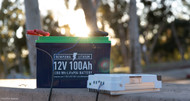FAQ: PRODUCT MATCHING
27th Feb 2023
Throughout the course of this new blog series, we’ll be looking at some of the most frequently asked questions raised by our customers and share our responses/recommendations for each!
Question #1: I already own a battery, can you recommend solar panels and inverters?
Answer: Let’s say for this example, that it’s a 12V 100Ah lithium battery. In terms of solar panel recommendations, we’d suggest running anywhere from a single 200-250W solar panel or 2+ 100W solar panels. This will allow you to add a couple more batteries to your setup. It’s always helpful to plan out your system for your future needs. For example, we recommend getting an inverter at or over the watts of your system. For example, if you have a 1800W system in total, you’ll want a 2000W inverter. Also, make sure the inverter you choose is compatible with your battery type.
Question #2: I already have solar panels, can you recommend me a charge controller/battery?
Answer: When it comes to choosing a solar charge controller, you’ll need to consider a few aspects, such as the amperage and whether it’s compatible with the battery of your choosing. With the emergence and popularity of lithium batteries, charge controllers have to begin migrating over to lithium compatibility. A lithium-compatible controller would be our recommended controller of choice regarding battery acceptance. Now in terms of amps, the higher the better. You’ll need to factor in the short-circuit amperage of your panels and how you’ll wire them (Series or Parallel). In terms of our products, we recommend the Frigate 40A MPPT charge controller and LiFePO4 12V 100Ah lithium battery due to their high-level performance and overall efficiency.
Question #3: I have a complete system (solar panels, charge controllers, batteries), but I need more solar panels. What do you recommend?
Answer: There’s a fairly straightforward answer to this one. You don’t want to mix wattages as your system will be limited by the lowest wattage panel. Always try to stay within the same or similar panel parameters.
We hope this FAQ article has been both informative and helpful for you, as we plan on bringing you this new blog series to help reaffirm our commitment to educating our customers on the benefits of solar. Stay tuned as there will be more FAQ articles in the future.
